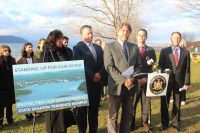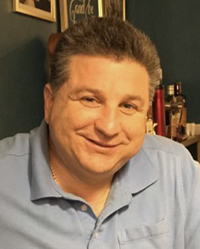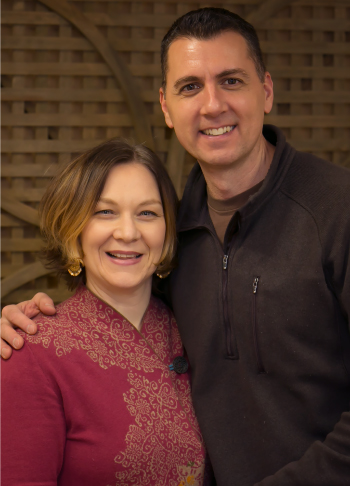Officials Call for Plan for Barges in Hudson to be Scrapped

Several elected officials and students from an area environmental clinic called on the U.S. Coast Guard last week to scrap plans to create 43 new anchorages in 10 locations along the Hudson River after it was revealed the federal agency allegedly violated its own protocol.
At a frigid press conference at Kingsland Point Park in Sleepy Hollow on December 5, Westchester County Executive Rob Astorino, state senators Terrence Murphy (R/Yorktown), David Carlucci (D/Clarkstown) and Sue Serino (R/Hyde Park), professor John Cronin from Pace University and students from the Pace Environmental Policy Clinic charged the Coast Guard was circumventing its own procedures to benefit the shipping industry with anchorages for oil barges from Yonkers to Kingston.
“This is not about politics. It is about doing the right thing for the people who live in the Hudson Valley,” said Murphy, who also asked the Coast Guard to extend the public comment period beyond December 6.
“We’re here to collectively and loudly tell the Coast Guard we’re not here to turn back decades of progress on the Hudson River,” Carlucci said. “We’re not going to stop while our Hudson River is in jeopardy. Together we will make sure we protect the integrity of the Hudson River.”
On December 5, students from Pace sent a petition to Coast Guard Admiral Paul Zukunft demanding the immediate withdrawal of the proposal based on research they had done on the Coast Guard’s July 2015 “Waterways Management Anchorage Management Tactics, Techniques and Procedures.”
The students contended prior to publishing the proposal in the federal register in June the Coast Guard should have completed two major studies, addressing river hazards and impacts, conducted public sessions with mariners, environmental groups and government, and provided all members of the public the opportunity to change the plan.
“How amazing is it that it took students from Pace University to shame and embarrass (the federal government)?” Astorino remarked. “The process has been trampled on. Voices need to be heard in the process that are trying to be stymied by the federal government.”
Murphy, Carlucci and Serino held an informal public hearing in Croton in October. Coast Guard officials, who never officially notified municipalities or government leaders about the proposal, have stated they plan to hold public hearings in the spring.
“The Coast Guard essentially has been running a covert process in plain sight,” Cronin said. “What they told us by filing this proposal is they were kicking off the process. In fact, by filing this notice they skipped over the process and insulated themselves from public comment. They made it impossible for anyone to respond and they knew it.”
In August, the Maritime Association of the Port of NY/NJ issued a letter of support to the Coast Guard for the anchorages plan, with Executive Director Edward Kelly stating, “the establishment of necessary federally designated anchorage areas in the Hudson River…will serve to provide critical infrastructure which is vital to the safe, secure and efficient transport of people and goods in the Hudson River.”
“Additionally, it is well recognized that the marine transportation mode: Is the cleanest and most environmentally friendly; Is the most fuel efficient; Requires minimal Infrastructure; Reduces roadway congestion and wear/tear, thus reducing the need for public infrastructure expenditures; Reduces emissions (air and water); Eliminates over 3.1 million truck trips in NYC annually,” Kelly stated.
“There currently are no formal anchorages on the Hudson River. The Hudson River requires sufficient anchorages to ensure navigational safety by allowing vessels designated areas in which to anchor when weather, visibility restrictions, emergencies, security requirements, and/or seasonal conditions constrict the ability to proceed safely,” Kelly continued. “The proposed anchorages have been promulgated, discussed and agreed among the major commercial users of the waterway. The Hudson River has been a highly utilized commercial waterway for centuries. Any development along the river has been relatively recent. If one moves next to an airport, one should expect to experience a certain modicum of air traffic and noise. The same principle holds true on the waterway.”

Rick has more than 40 years’ experience covering local news in Westchester and Putnam counties, running the gamut from politics and crime to sports and human interest. He has been an editor at Examiner Media since 2012. Read more from Rick’s editor-author bio here. Read Rick’s work here: https://www.theexaminernews.com/author/pezzullo_rick-writer/

